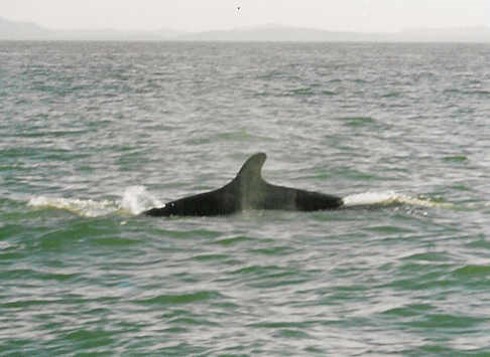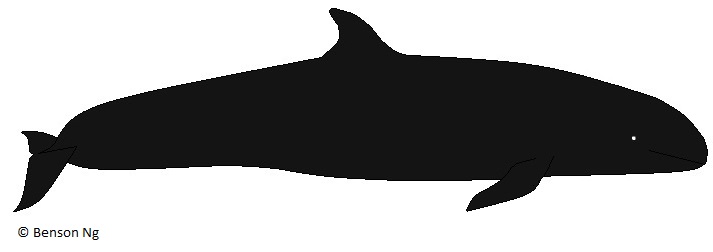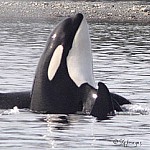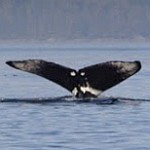The False Killer whale (Pseudorca crassidens) is the third largest member of the dolphin family. They live in temperate and tropical waters throughout the world, and occasionally find their way into BC waters. As it’s name implies, the False Killer whale shares characteristics, such as appearance, with the more widely known Orca but the two species do not belong to the same genus. False Killer whales are also similar to some species of Orca as they do chase and attack other dolphins and whales, like young Humpback whales.
Adult False Killer whales can reach a length of 6 meters (19 feet). They have a long, slender body that is black except for a patch on the ventral side between their flippers that is lighter in colour (gray). The head is elongated and tapered from the blowhole forward. The dorsal fin is sickle-shaped, and its flippers are narrow, short, and pointed with a unique bend at the mid-point.
False Killer whales can travel up to 25 km/h. They feed on squid and large fish such as tuna, bonita, and mahi-mahi. In addition to occasionally feeding on dolphins and whales, they have been observed to attack and eat sharks. False Killer whales form strong social bonds and are usually found in groups of 10 – 20. Large groups numbering in the hundreds also occurs. They approach ships and have been observed to bow ride. They are known to “strand” or beach themselves in large groups. For example on June 2, 2005, an estimated 140 False Killer whales were beached at Geographe Bay in Western Australia. Most of them were successfully returned to the sea with the help of 1500 volunteers. One of the largest mass strandings of cetaceans occurred in 1946 when 800 False Killer whales were stranded in La Plata, Argentina.
False Killer whale (Pseudorca crassidens) Specifics:
Length:
up to 6 m (19 ft)
Weight:
up to 2200 kg (4900 lbs)
Colour:
Body mainly black body
Gray patch between their flippers
Features:
Slender, torpedo-shaped body
Head tapered towards snout
Dorsal fin located mid-body
Flippers short and narrow with unique bend at mid-point




